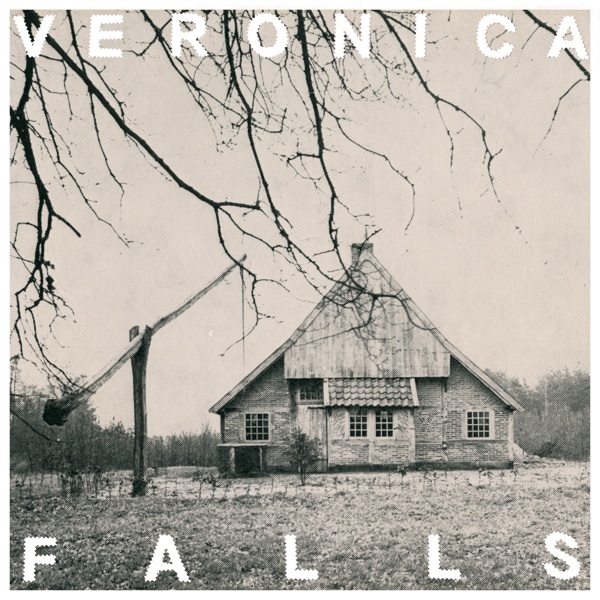A stark black and white scene of an old house, framed by bare branches reaching down: the Veronica Falls album cover looks more like the last Harvey Milk record than most of their indiepop contemporaries’ albums. It does, though, tell you a lot about what’s inside. Veronica Falls deal in the monochrome, in carefully put together pop songs that feel as constructed and timeless as a posed old portrait photograph and as shot through with as much mystery as a unlabelled picture. Like that photo on the cover, their music is sometimes unsettling and foreboding: every song on the record is touched by the dark, the seedy, the mysterious and the illicit. But unlike Harvey Milk, Veronica Falls’ mysteries are revealed through brilliantly catchy pop songs, any dourness tempered by some of the best indiepop melodies and arrangements I’ve heard in a long time.
It’s taken them a while to get to this point. Apparently signed to Captured Tracks within hours of making a page on MySpace (on the strength of previous bands Sexy Kids and The Royal We), this is their first release after just a few well-received 7″s over the past couple of years. The Veronica Falls sound is a pretty simple one to describe: two guitars, drums, bass, and interlocking harmony vocals from the whole band, which are all over the record (there’s hardly a vocal line that isn’t either doubled or answered by the backing lines). It’s a basic formula, but an enduring one: these songs really could have been written any time in the last forty years. The thrashed but clean guitars reach back to the Velvets, whose influence looms large: the opening section of album closer “Come on Over” recalls the long vamps of “What Goes On.” The vocal harmonies aren’t so much girl-group-y, as per the current vogue, as tracing a line back to English folk. The naive innocence of Roxanne Clifford’s voice recalls the early Fairport Convention albums, and the snippet of the traditional song “Rose, Rose” which ends “Misery” could have come from one of their later records.
There are the more standard indiepop touchstones, too: the strong drumbeat and shaky guitar riff which open “The Box” sound like the Jesus and Mary Chain around Darklands, before deviating into a characteristically catchy chorus, and Clifford’s unaffected vocals are in the vein of Alison Statton from Young Marble Giants. Other than that, the album’s musical heritage sounds closer to the DIY pop of Scotland’s Postcard Records scene (some of the band are from Glasgow), New Zealand’s Flying Nun or the early output of Slumberland. The album’s timelessness extends to its production, too. There’s no fake lo-fi hiss or fuzz, and the songs have been cleaned up since we first heard them, because the band simply don’t need to hide behind that. The recording is clean and clear and simple, with vocals to the front.
Those who enjoyed the early singles will find both of them here; “Found Love in a Graveyard” in a much better re-recorded version. It opens the album and almost works as a Veronica Falls manifesto: sweet female lead vocals but with a dark and sinister undercurrent, it’s the best indiepop song about love with ghosts since My Bloody Valentine’s “Paint a Rainbow.” “Stephen,” originally wasted as the B-side to “Beachy Head,” is back too, combining an naggingly catchy melody with hints of an illicit affair. “Stephen, take off your wedding ring,” sings Clifford, well cast in the role of ingenue. “Misery,” which, instead of the self-pity the title might suggest, is a song of weary acceptance and an album highlight, complete with celebratory backing vocals: “misery, my old friend.” Even “Wedding Day,” one of the lighter songs, is a picture of a complicated love triangle. But while the lyrics are far from the twee stereotype, the arrangements (and especialy the backing vocals) draw on the best of their influences along with some really great original hooks.
Strangely, the songs mostly stick to one tempo, and when they do vary that (as on the title track) the result is disappointingly quite flat. That’s indicative of the album’s major fault: it all tends to sound a bit similar. A few choice chord sequences make multiple appearances, and while the best tracks have moments of greatess to set them apart (the guitar figures of “Stephen,” the chorus of “Beachy Head”) a couple of songs towards the end tend to sag a bit. That said, it’s part of the territory for indiepop to stick quite rigidly to the same palette of sounds, so it can’t really be levelled as a criticism, and the songs are mostly good enough to sustain interest through multiple listens. But criticising indiepop as good as this for being a bit sonically unadventurous would be like criticising drone doom metal for lacking singalong tunes: it isn’t really the point.

